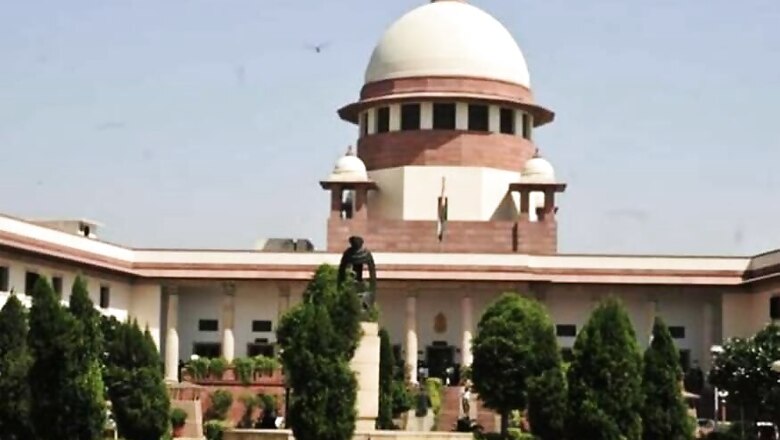
views
The Supreme Court on Friday referred to a seven-judge bench the issue whether states can grant benefit of remission to convicts under the Constitution by laying down a common policy and without scrutinising "facts and materials" of each case by the Governor.
The vexatious legal issue caught the attention of the top court, which, while hearing the bail plea of a murder case convict Pyare Lal, was told that he has now been released from the jail after being granted the benefit of remission by the Haryana Governor under Article 161 (judicial power of Governor to pardon a convict) as per a policy of the state government.
The state government on the occasion of Independence Day in 2019, in exercise of its powers under Article 161 of the Constitution, had decided to grant special remission to certain categories of prisoners such as if a male prisoner, convicted for life in a murder case, is above 75 years of age and completed 8 years of sentence, then he will be granted the benefit of remission.
However, under Section 433A of the Code of Criminal Procedure (CrPC), a person, serving life term, cannot be granted remission benefit without serving 14 years inside jail.
A bench comprising Justice U U Lalit, M M Shantanagoudar and Vineet Saran referred to a judgement of a five-judge bench, rendered in 1978 in the Maru Ram case, and said Justice V R Krishna Iyer, writing for the majority, had said there was no need for the state to pass a separate order in each individual case for granting the benefit of remission but the general order must be clear enough to identify the group of cases and indicate the application of mind to the whole group.
"The basis for such a conclusion is in the discussion but at the same time the order issued on July 18, 1978 in exercise of powers conferred under Article 161 of the Constitution which in an omnibus way had granted benefit to the convicts, did not meet with the approval of the Court."
Referring to the inconsistency in the 1978 verdict, Justice Lalit, writing the judgement, decided to refer the issue to a larger bench to examine the "correctness and propriety of such a exercise" of the state.
"Whether in exercise of power conferred under Article 161 of the Constitution a policy can be framed, hereunder certain norms or postulates are laid down, on the satisfaction of which the benefit of remission can thereafter be granted by the Executive without placing the facts or material with respect to any of the cases before the Governor and whether such exercise can override the requirements under Section 433-A of the (Penal) Code," reads the sole question framed by the bench for consideration of the larger bench.
"We, therefore, direct the Registry to place the matter before the Chief Justice for constituting a Bench of appropriate strength to consider the issues raised in the present matter," the bench said in its 24-page judgement.
The top court, in the judgement, referred to the powers of the President and the Governors under the Constitution and the parameters laid down under section 433 A of the Code of Criminal Procedure to grant pardon to convicts and extensively dealt with the 1978 verdict of the Constitution bench.
"However, the question that arises is whether in exercise of power under Article 161 of the Constitution, a policy could be laid down setting out certain norms or postulates, on the satisfaction of which the benefit could thereafter be conferred upon or granted to the convicts by the executive without even placing the individual facts and material pertaining to the case of the convict, before the Governor," it said.
It then examined the 2019 policy of the Haryana government to grant remission benefits to certain classes of convicts.
Every convict "(i) if the age of the convict was above 75 years in case of a male and above 65 years in case of a female, (ii) and, if the convict had completed 8 years or 6 years of actual sentence respectively, (iii) and, if the conduct of the convict in jail was satisfactory, in that the convict had not committed any major jail offence in the last two years, (iv) and the convict did not come within any of the exceptions laid down in para (2) of the Policy; the convict was released forthwith," said the judgement on Haryana's policy.
The state government also accepted that no individual facts or material pertaining to any of the cases were placed before the Governor and the remission benefits were granted as per the Policy, it said.
"The Governor, thus, did not have the occasion to look into the issues such as severity of the crime or the manner in which the crime was committed or the impact of the crime on the Society or how the matter was seen and considered by the concerned courts while holding or upholding that the concerned convicts were found guilty of the offences in question," the apex court said while referring the legal issue to the larger bench.
Earlier, the top court had sought response of the Haryana government after questioning the policy to grant remission in view of the fact that Section 433A provides that a person, serving the life term, cannot be granted the benefits before serving 14 years in jail.




















Comments
0 comment